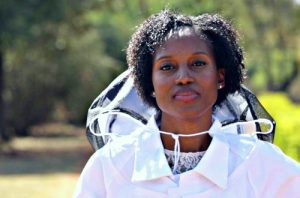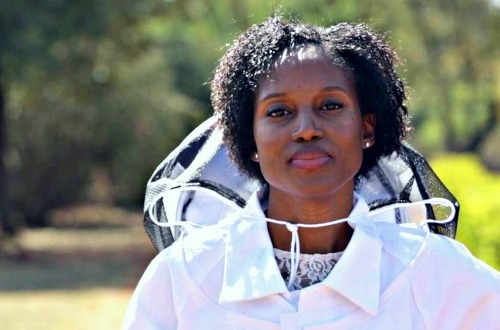
There are two things that set Mmabatho Morudi apart. Firstly, she is fanatical about bees. Secondly she is a dynamic up-and-coming entrepreneur whose potential was noted by none other than Virgin Group founder, Richard Branson.
Combining these two passions, the agri-preneur became a qualified beekeeper – something rather unusual for a young black woman.
Together with her partner, Desmond Morudi, they own a beekeeping and agricultural produce business, Iliju Bee Farm, located in Winterveld, north-west of Pretoria.
The local honey industry, according to the Conservation South Africa (CSA), has an average annual turnover of R3.2 billion and is currently producing 2 000 tonnes of honey per annum. In total, however, the pollination, honey, and beeswax industry in the country is worth R20 billion, an M&G article states.
Beekeeping for Morudi, was never part of the plan, she says. It was only after her grandfather, Dr Sam Motsuenyane, suggested they attend a course in beekeeping that the interest arose.
“Going into bee farming happened by chance. Even though I had always had an interest in agriculture I was rather comfortable in my corporate job. Our grandfather, who at the time was 85, suggested we go for a course in bee farming following what we at the time thought was a problem. Bees would settle in our ceiling and produce so much honey that the ceiling would collapse. I enjoyed the course so much that I went on to complete the advanced course and start the business,” says Morudi.
It was while studying that she discovered that there was a huge shortage of good quality honey in SA and that most of the country’s honey was imported from China, she says.
“I wanted to bridge that gap, but with time realised that the business had the potential to change lives in rural SA.”
Going beyond honey
Into her foray into the world of agriculture and business, Morudi came into contact with many farmers around Winterveld who were also trying to turn their subsistence farming into something more commercial. She realised, however, that the farmers were faced with two big challenges – ensuring good quality produce and places to sell their produce once it had been harvested.
This became the central part of Morudi’s business. The bees would help the farmers with pollination which improves their crops and yields and the more the farmers grew their produce, the more the bees had food to survive.
“Once the produce is ready we buy it and beautifully package it in wooden crates and deliver to homes, wellness centres and companies,” she says. This is when Morudi founded The Village Market SA, an emporia of village produce and products including raw honey, preserves and vegetables. They also sell their produce at the Neighbourgoods Market in Braamfontein.
The business has also expanded to include the Village Collective, where women from the Winterveld area make pillows and bags which they sell at various markets and to corporate clients.
SME South Africa speaks with Morudi about her unusual passion for bees and why being young and black in the sector places a lot of pressure on one to succeed.
“Being young and black definitely places a lot of pressure on one to succeed as that will encourage other young people to reach for their dreams”
An unusual occupation
Most people still consider bees to be pests so whenever people find out our core business is bee farming, the first reaction is intrigue and then curiosity. In most cases, the first question is are you not afraid of them.
SA’s beekeeping industry
South Africa does have an active beekeeping industry, however, there are few major players. The majority are hobbyist beekeepers. As far as we know there are no recent market size figures available but based on old statistics, a lot of our honey still comes from countries such as China and Argentina while we also contribute very little to the global consumption.
Fulfilling a specific need
Initially, when we started the business, it was really about bridging the gap in the shortage of honey that was being experienced globally but with time realised our model had potential to positively impact rural communities.
The Village Market is centred around using bees for development in rural communities and addressing the different social ills specific to the community. For example in Winterveldt we place our hives on the community members plots at no cost to assist with crop pollination and encourage the planting of crops as forage for the bees, the produce is bought back from the community and sold through our organic vegetables home delivery service.
In KZN, The village market in partnership with Elephant, Rhinos and People (ERP) has embarked on a KZN/Moz cross-border initiative where a bee fence has been constructed as a natural deterrent to crop raiding elephants from crossing over. TVM has trained the community in beekeeping and will be buying back the honey from the community. As a result, saving the bees, elephants and people and ensuring a continuous honey supply.
Getting a foot in the door
Getting into the business was fairly easy but staying in the business has been a challenge. Our biggest challenge has been capital to grow the business as bee farming is about volumes that one can produce and also ensuring that our bees are happy and healthy and also getting a buy-in from rural farmers as bees are considered to be pests so it was difficult to have people agree to have hives on their land.
We have increased our business offerings to include an organic vegetable home delivery service which is able to see us have running costs and also through the help of researchers from the University of Pretoria will ensure that our occupancy rate is high and raised awareness around the importance of bees.
Being young and black
It definitely places a lot of pressure on one to succeed as that will encourage other young people to reach for their dreams. Because we know the challenges of our communities, economic development is an integral part of our business model.
The funding challenge
Initially, we received a donation from the Dr Sam Motsuenyane Rural development foundation to cover our startup costs but mostly it was self-funded. I quit my job and used the money towards the business while my husband and business partner worked in corporate in order to keep the business going until recently when he joined the business full time.
The business also won a number of competitions including being the first runner-up for the Gibs Festival of Ideas competition. The business also received some support from organisations such Spark Int, PEACE foundation and Bloodless.
Getting the right business and revenue model
We have seen a steady growth in the business and this was because people were genuinely interested in what we had to offer but in the beginning, we had to learn the art of reinvention when something didn’t work.
Throughout this whole process of establishing the business, one has learnt that one needed to be open to changes when an initial idea doesn’t work.
Planning for future growth
We see the business growing organically through a network format but will consider acquisitions when the time is right.
The evolution of the industry
Hopefully the industry will change in such a way that agriculture becomes more attractive for the young and not considered to be a career for old people and how The Village Market sees itself playing a role is through ensuring that we portray it in the most attractive, vibrant and cool form as possible while imparting skills through training and mentoring.






